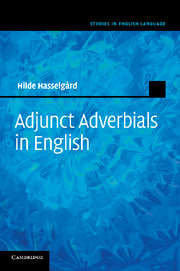Book contents
- Frontmatter
- Contents
- List of Figures
- List of Abbreviations
- Preface
- Part I A framework for analysing adverbials
- Part II Adverbial positions: theme, cohesion and information dynamics
- Part III Semantic types of adverbials: subtypes, frequencies and usage
- Part IV Adjunct adverbials in English
- 12 Adverbial usage across text types
- 13 The grammar of English adjuncts: summary of findings and concluding remarks
- Appendix
- References
- Index
12 - Adverbial usage across text types
Published online by Cambridge University Press: 03 May 2010
- Frontmatter
- Contents
- List of Figures
- List of Abbreviations
- Preface
- Part I A framework for analysing adverbials
- Part II Adverbial positions: theme, cohesion and information dynamics
- Part III Semantic types of adverbials: subtypes, frequencies and usage
- Part IV Adjunct adverbials in English
- 12 Adverbial usage across text types
- 13 The grammar of English adjuncts: summary of findings and concluding remarks
- Appendix
- References
- Index
Summary
Introduction
The material in the core corpus contains four written and two spoken text types: personal letters, fiction, news reportage, academic writing, conversation and sports commentaries. As stated in section 1.3.4, these were selected because they were considered to represent different areas of language use. The text types differ along a number of variables, as was indicated in table 1.1: the spoken/written dimension, (degree of) participant interaction, time constraint under production, planning and editing of the text and private versus public. They also differ as to level of formality, with the two spoken text types and personal letters representing (relatively) informal language and news reportage and academic writing being more formal. The fiction texts vary in their degree of formality. As regards subject matter, there is great variation both within and across text types. For example, the sports commentaries texts comprise different sports, and the academic writing texts have been taken from different academic disciplines. (See the Appendix for a list of the texts included in the core corpus.)
The text types do not contain equal numbers of adjuncts, as visualised in figure 12.1. The highest frequency of adjuncts is found in commentaries, followed by fiction. The lowest frequencies are found in conversation, academic writing and news. The present chapter investigates variation in adjunct use across text types. The text types are compared for the distribution of different semantic and syntactic types of adjuncts as well as the use of adverbial positions and the occurrence of adjuncts in sequence.
- Type
- Chapter
- Information
- Adjunct Adverbials in English , pp. 259 - 285Publisher: Cambridge University PressPrint publication year: 2010



